Reflective Essay on Leadership: Knowing, Going, and Showing the Way
VerifiedAdded on 2023/05/28
|5
|2093
|316
Essay
AI Summary
This reflective essay explores the author's understanding of leadership through personal experiences and organizational learning theories, drawing upon John C. Maxwell's quote, 'a leader is one who knows the way, goes the way, and shows the way.' The essay reflects on the importance of vision, trust, and the ability to inspire others, highlighting the difference between being a manager and a true leader. It emphasizes the significance of knowing the path, following it, and guiding others with confidence, trustworthiness, and passion. The author reflects on past experiences in academic and professional settings, illustrating how leadership is more about action than title and how true leaders inspire others to learn, dream, do, and become more. The essay concludes with the realization that leadership begins with humility and a commitment to impacting society positively. Desklib provides access to similar essays and solved assignments for students.
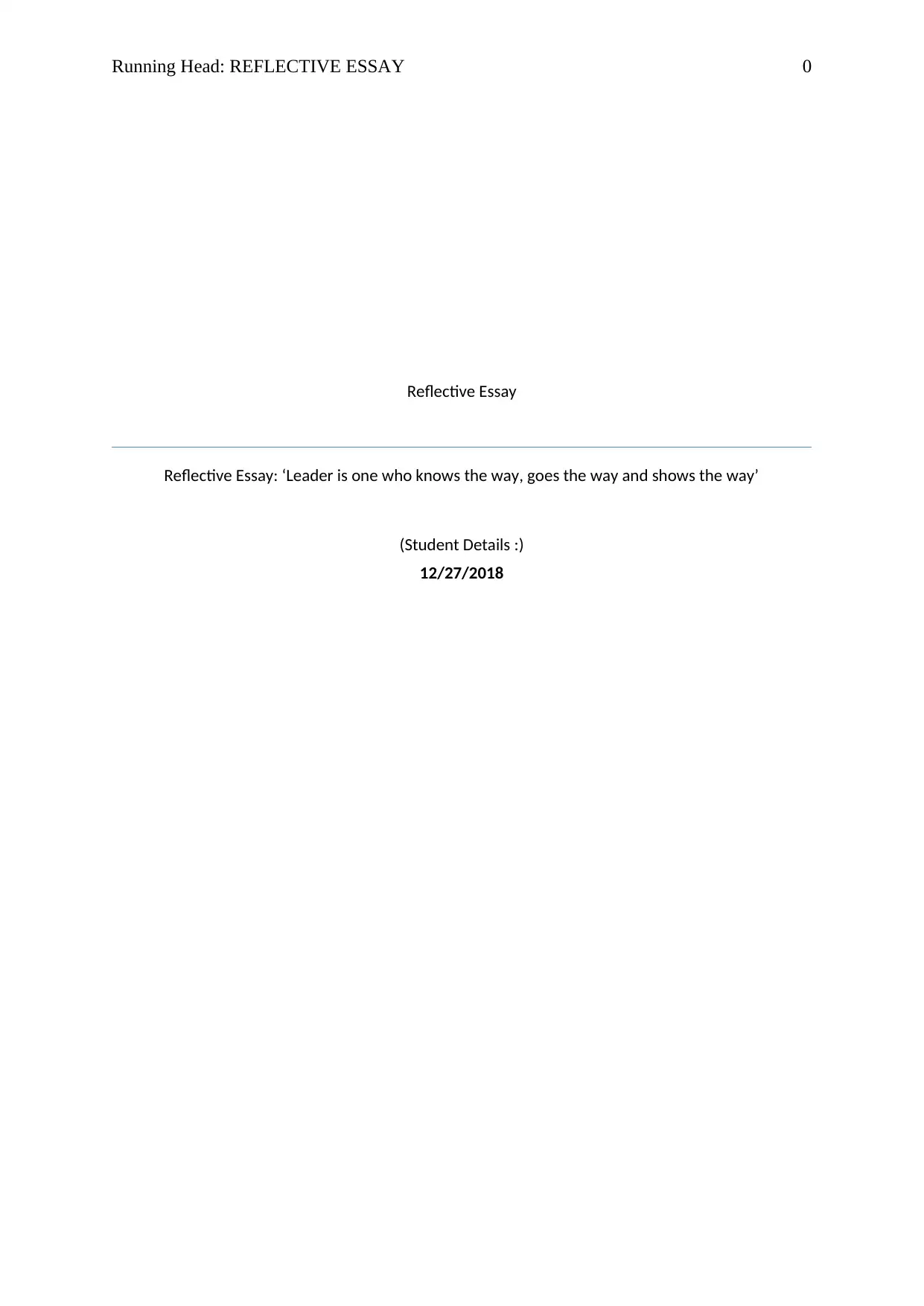
Running Head: REFLECTIVE ESSAY 0
Reflective Essay
Reflective Essay: ‘Leader is one who knows the way, goes the way and shows the way’
(Student Details :)
12/27/2018
Reflective Essay
Reflective Essay: ‘Leader is one who knows the way, goes the way and shows the way’
(Student Details :)
12/27/2018
Paraphrase This Document
Need a fresh take? Get an instant paraphrase of this document with our AI Paraphraser
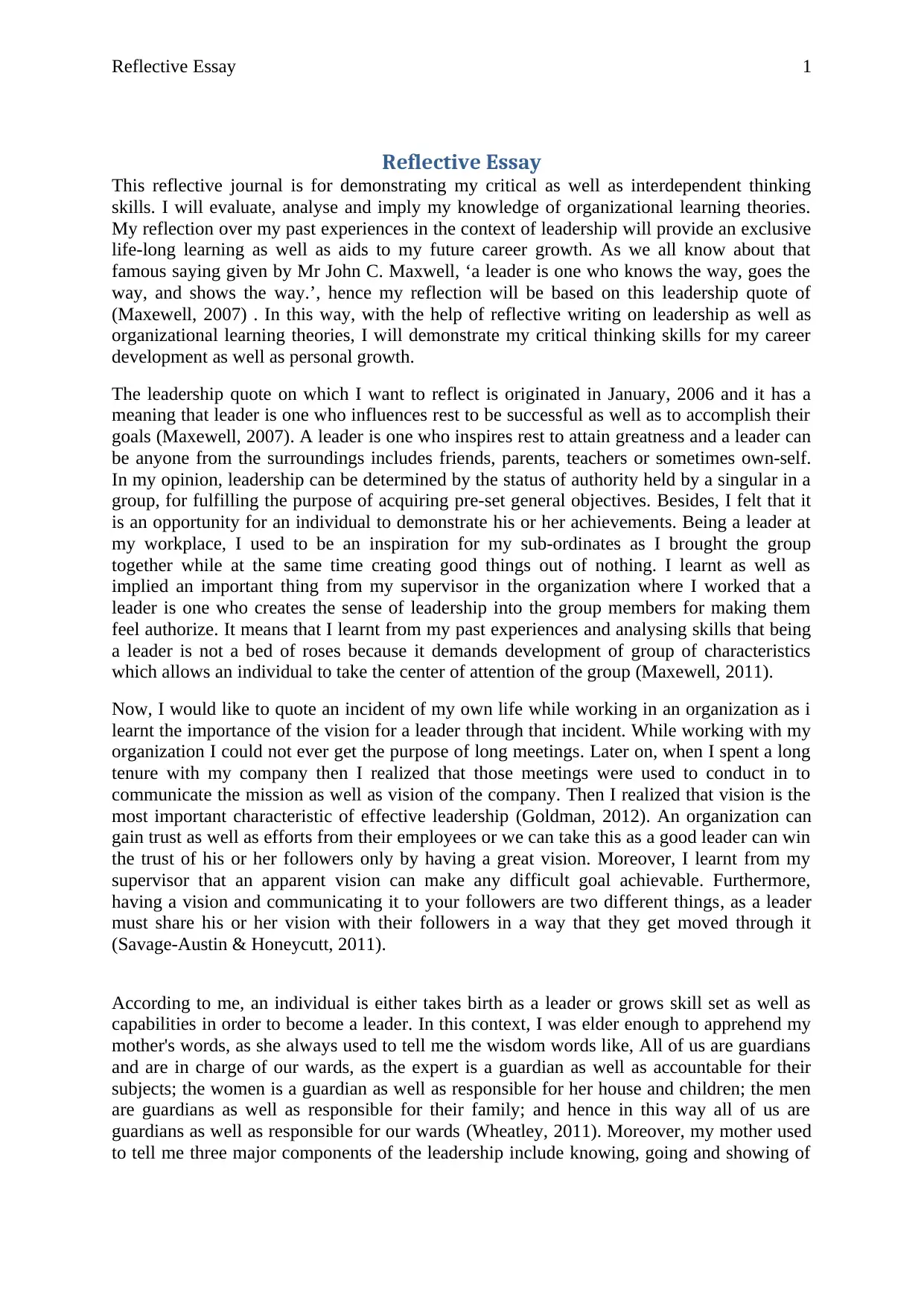
Reflective Essay 1
Reflective Essay
This reflective journal is for demonstrating my critical as well as interdependent thinking
skills. I will evaluate, analyse and imply my knowledge of organizational learning theories.
My reflection over my past experiences in the context of leadership will provide an exclusive
life-long learning as well as aids to my future career growth. As we all know about that
famous saying given by Mr John C. Maxwell, ‘a leader is one who knows the way, goes the
way, and shows the way.’, hence my reflection will be based on this leadership quote of
(Maxewell, 2007) . In this way, with the help of reflective writing on leadership as well as
organizational learning theories, I will demonstrate my critical thinking skills for my career
development as well as personal growth.
The leadership quote on which I want to reflect is originated in January, 2006 and it has a
meaning that leader is one who influences rest to be successful as well as to accomplish their
goals (Maxewell, 2007). A leader is one who inspires rest to attain greatness and a leader can
be anyone from the surroundings includes friends, parents, teachers or sometimes own-self.
In my opinion, leadership can be determined by the status of authority held by a singular in a
group, for fulfilling the purpose of acquiring pre-set general objectives. Besides, I felt that it
is an opportunity for an individual to demonstrate his or her achievements. Being a leader at
my workplace, I used to be an inspiration for my sub-ordinates as I brought the group
together while at the same time creating good things out of nothing. I learnt as well as
implied an important thing from my supervisor in the organization where I worked that a
leader is one who creates the sense of leadership into the group members for making them
feel authorize. It means that I learnt from my past experiences and analysing skills that being
a leader is not a bed of roses because it demands development of group of characteristics
which allows an individual to take the center of attention of the group (Maxewell, 2011).
Now, I would like to quote an incident of my own life while working in an organization as i
learnt the importance of the vision for a leader through that incident. While working with my
organization I could not ever get the purpose of long meetings. Later on, when I spent a long
tenure with my company then I realized that those meetings were used to conduct in to
communicate the mission as well as vision of the company. Then I realized that vision is the
most important characteristic of effective leadership (Goldman, 2012). An organization can
gain trust as well as efforts from their employees or we can take this as a good leader can win
the trust of his or her followers only by having a great vision. Moreover, I learnt from my
supervisor that an apparent vision can make any difficult goal achievable. Furthermore,
having a vision and communicating it to your followers are two different things, as a leader
must share his or her vision with their followers in a way that they get moved through it
(Savage-Austin & Honeycutt, 2011).
According to me, an individual is either takes birth as a leader or grows skill set as well as
capabilities in order to become a leader. In this context, I was elder enough to apprehend my
mother's words, as she always used to tell me the wisdom words like, All of us are guardians
and are in charge of our wards, as the expert is a guardian as well as accountable for their
subjects; the women is a guardian as well as responsible for her house and children; the men
are guardians as well as responsible for their family; and hence in this way all of us are
guardians as well as responsible for our wards (Wheatley, 2011). Moreover, my mother used
to tell me three major components of the leadership include knowing, going and showing of
Reflective Essay
This reflective journal is for demonstrating my critical as well as interdependent thinking
skills. I will evaluate, analyse and imply my knowledge of organizational learning theories.
My reflection over my past experiences in the context of leadership will provide an exclusive
life-long learning as well as aids to my future career growth. As we all know about that
famous saying given by Mr John C. Maxwell, ‘a leader is one who knows the way, goes the
way, and shows the way.’, hence my reflection will be based on this leadership quote of
(Maxewell, 2007) . In this way, with the help of reflective writing on leadership as well as
organizational learning theories, I will demonstrate my critical thinking skills for my career
development as well as personal growth.
The leadership quote on which I want to reflect is originated in January, 2006 and it has a
meaning that leader is one who influences rest to be successful as well as to accomplish their
goals (Maxewell, 2007). A leader is one who inspires rest to attain greatness and a leader can
be anyone from the surroundings includes friends, parents, teachers or sometimes own-self.
In my opinion, leadership can be determined by the status of authority held by a singular in a
group, for fulfilling the purpose of acquiring pre-set general objectives. Besides, I felt that it
is an opportunity for an individual to demonstrate his or her achievements. Being a leader at
my workplace, I used to be an inspiration for my sub-ordinates as I brought the group
together while at the same time creating good things out of nothing. I learnt as well as
implied an important thing from my supervisor in the organization where I worked that a
leader is one who creates the sense of leadership into the group members for making them
feel authorize. It means that I learnt from my past experiences and analysing skills that being
a leader is not a bed of roses because it demands development of group of characteristics
which allows an individual to take the center of attention of the group (Maxewell, 2011).
Now, I would like to quote an incident of my own life while working in an organization as i
learnt the importance of the vision for a leader through that incident. While working with my
organization I could not ever get the purpose of long meetings. Later on, when I spent a long
tenure with my company then I realized that those meetings were used to conduct in to
communicate the mission as well as vision of the company. Then I realized that vision is the
most important characteristic of effective leadership (Goldman, 2012). An organization can
gain trust as well as efforts from their employees or we can take this as a good leader can win
the trust of his or her followers only by having a great vision. Moreover, I learnt from my
supervisor that an apparent vision can make any difficult goal achievable. Furthermore,
having a vision and communicating it to your followers are two different things, as a leader
must share his or her vision with their followers in a way that they get moved through it
(Savage-Austin & Honeycutt, 2011).
According to me, an individual is either takes birth as a leader or grows skill set as well as
capabilities in order to become a leader. In this context, I was elder enough to apprehend my
mother's words, as she always used to tell me the wisdom words like, All of us are guardians
and are in charge of our wards, as the expert is a guardian as well as accountable for their
subjects; the women is a guardian as well as responsible for her house and children; the men
are guardians as well as responsible for their family; and hence in this way all of us are
guardians as well as responsible for our wards (Wheatley, 2011). Moreover, my mother used
to tell me three major components of the leadership include knowing, going and showing of
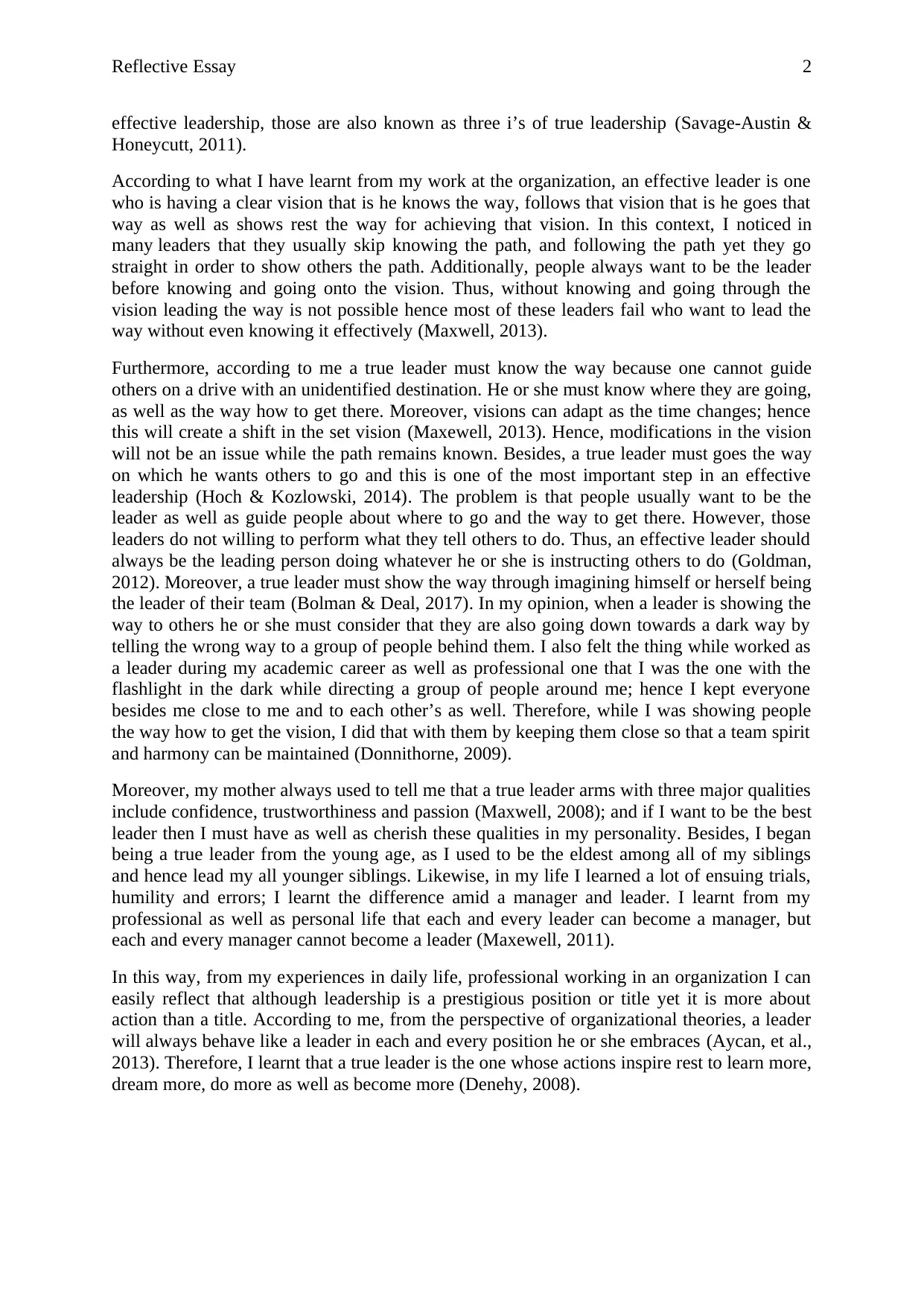
Reflective Essay 2
effective leadership, those are also known as three i’s of true leadership (Savage-Austin &
Honeycutt, 2011).
According to what I have learnt from my work at the organization, an effective leader is one
who is having a clear vision that is he knows the way, follows that vision that is he goes that
way as well as shows rest the way for achieving that vision. In this context, I noticed in
many leaders that they usually skip knowing the path, and following the path yet they go
straight in order to show others the path. Additionally, people always want to be the leader
before knowing and going onto the vision. Thus, without knowing and going through the
vision leading the way is not possible hence most of these leaders fail who want to lead the
way without even knowing it effectively (Maxwell, 2013).
Furthermore, according to me a true leader must know the way because one cannot guide
others on a drive with an unidentified destination. He or she must know where they are going,
as well as the way how to get there. Moreover, visions can adapt as the time changes; hence
this will create a shift in the set vision (Maxewell, 2013). Hence, modifications in the vision
will not be an issue while the path remains known. Besides, a true leader must goes the way
on which he wants others to go and this is one of the most important step in an effective
leadership (Hoch & Kozlowski, 2014). The problem is that people usually want to be the
leader as well as guide people about where to go and the way to get there. However, those
leaders do not willing to perform what they tell others to do. Thus, an effective leader should
always be the leading person doing whatever he or she is instructing others to do (Goldman,
2012). Moreover, a true leader must show the way through imagining himself or herself being
the leader of their team (Bolman & Deal, 2017). In my opinion, when a leader is showing the
way to others he or she must consider that they are also going down towards a dark way by
telling the wrong way to a group of people behind them. I also felt the thing while worked as
a leader during my academic career as well as professional one that I was the one with the
flashlight in the dark while directing a group of people around me; hence I kept everyone
besides me close to me and to each other’s as well. Therefore, while I was showing people
the way how to get the vision, I did that with them by keeping them close so that a team spirit
and harmony can be maintained (Donnithorne, 2009).
Moreover, my mother always used to tell me that a true leader arms with three major qualities
include confidence, trustworthiness and passion (Maxwell, 2008); and if I want to be the best
leader then I must have as well as cherish these qualities in my personality. Besides, I began
being a true leader from the young age, as I used to be the eldest among all of my siblings
and hence lead my all younger siblings. Likewise, in my life I learned a lot of ensuing trials,
humility and errors; I learnt the difference amid a manager and leader. I learnt from my
professional as well as personal life that each and every leader can become a manager, but
each and every manager cannot become a leader (Maxewell, 2011).
In this way, from my experiences in daily life, professional working in an organization I can
easily reflect that although leadership is a prestigious position or title yet it is more about
action than a title. According to me, from the perspective of organizational theories, a leader
will always behave like a leader in each and every position he or she embraces (Aycan, et al.,
2013). Therefore, I learnt that a true leader is the one whose actions inspire rest to learn more,
dream more, do more as well as become more (Denehy, 2008).
effective leadership, those are also known as three i’s of true leadership (Savage-Austin &
Honeycutt, 2011).
According to what I have learnt from my work at the organization, an effective leader is one
who is having a clear vision that is he knows the way, follows that vision that is he goes that
way as well as shows rest the way for achieving that vision. In this context, I noticed in
many leaders that they usually skip knowing the path, and following the path yet they go
straight in order to show others the path. Additionally, people always want to be the leader
before knowing and going onto the vision. Thus, without knowing and going through the
vision leading the way is not possible hence most of these leaders fail who want to lead the
way without even knowing it effectively (Maxwell, 2013).
Furthermore, according to me a true leader must know the way because one cannot guide
others on a drive with an unidentified destination. He or she must know where they are going,
as well as the way how to get there. Moreover, visions can adapt as the time changes; hence
this will create a shift in the set vision (Maxewell, 2013). Hence, modifications in the vision
will not be an issue while the path remains known. Besides, a true leader must goes the way
on which he wants others to go and this is one of the most important step in an effective
leadership (Hoch & Kozlowski, 2014). The problem is that people usually want to be the
leader as well as guide people about where to go and the way to get there. However, those
leaders do not willing to perform what they tell others to do. Thus, an effective leader should
always be the leading person doing whatever he or she is instructing others to do (Goldman,
2012). Moreover, a true leader must show the way through imagining himself or herself being
the leader of their team (Bolman & Deal, 2017). In my opinion, when a leader is showing the
way to others he or she must consider that they are also going down towards a dark way by
telling the wrong way to a group of people behind them. I also felt the thing while worked as
a leader during my academic career as well as professional one that I was the one with the
flashlight in the dark while directing a group of people around me; hence I kept everyone
besides me close to me and to each other’s as well. Therefore, while I was showing people
the way how to get the vision, I did that with them by keeping them close so that a team spirit
and harmony can be maintained (Donnithorne, 2009).
Moreover, my mother always used to tell me that a true leader arms with three major qualities
include confidence, trustworthiness and passion (Maxwell, 2008); and if I want to be the best
leader then I must have as well as cherish these qualities in my personality. Besides, I began
being a true leader from the young age, as I used to be the eldest among all of my siblings
and hence lead my all younger siblings. Likewise, in my life I learned a lot of ensuing trials,
humility and errors; I learnt the difference amid a manager and leader. I learnt from my
professional as well as personal life that each and every leader can become a manager, but
each and every manager cannot become a leader (Maxewell, 2011).
In this way, from my experiences in daily life, professional working in an organization I can
easily reflect that although leadership is a prestigious position or title yet it is more about
action than a title. According to me, from the perspective of organizational theories, a leader
will always behave like a leader in each and every position he or she embraces (Aycan, et al.,
2013). Therefore, I learnt that a true leader is the one whose actions inspire rest to learn more,
dream more, do more as well as become more (Denehy, 2008).
⊘ This is a preview!⊘
Do you want full access?
Subscribe today to unlock all pages.

Trusted by 1+ million students worldwide
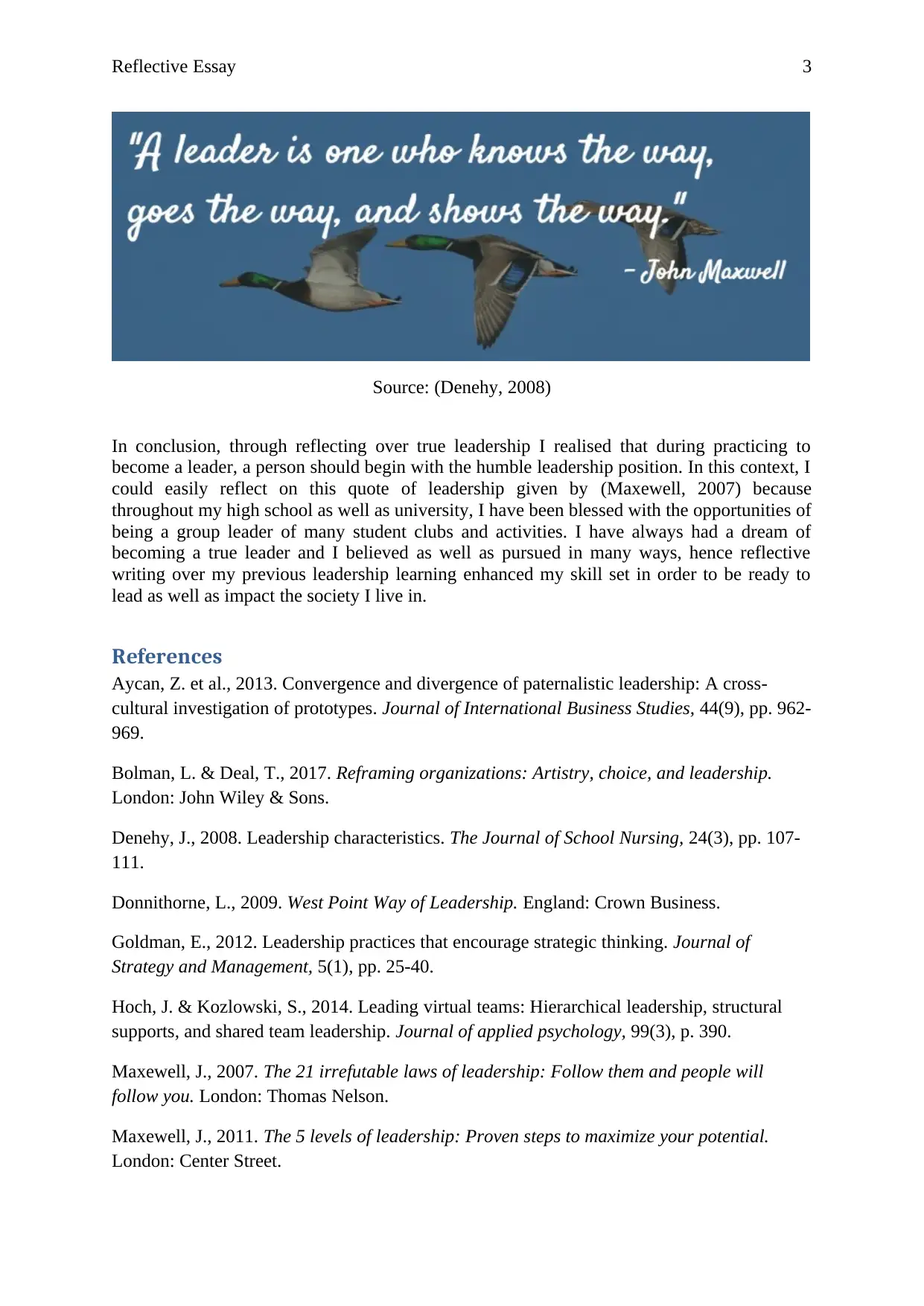
Reflective Essay 3
Source: (Denehy, 2008)
In conclusion, through reflecting over true leadership I realised that during practicing to
become a leader, a person should begin with the humble leadership position. In this context, I
could easily reflect on this quote of leadership given by (Maxewell, 2007) because
throughout my high school as well as university, I have been blessed with the opportunities of
being a group leader of many student clubs and activities. I have always had a dream of
becoming a true leader and I believed as well as pursued in many ways, hence reflective
writing over my previous leadership learning enhanced my skill set in order to be ready to
lead as well as impact the society I live in.
References
Aycan, Z. et al., 2013. Convergence and divergence of paternalistic leadership: A cross-
cultural investigation of prototypes. Journal of International Business Studies, 44(9), pp. 962-
969.
Bolman, L. & Deal, T., 2017. Reframing organizations: Artistry, choice, and leadership.
London: John Wiley & Sons.
Denehy, J., 2008. Leadership characteristics. The Journal of School Nursing, 24(3), pp. 107-
111.
Donnithorne, L., 2009. West Point Way of Leadership. England: Crown Business.
Goldman, E., 2012. Leadership practices that encourage strategic thinking. Journal of
Strategy and Management, 5(1), pp. 25-40.
Hoch, J. & Kozlowski, S., 2014. Leading virtual teams: Hierarchical leadership, structural
supports, and shared team leadership. Journal of applied psychology, 99(3), p. 390.
Maxewell, J., 2007. The 21 irrefutable laws of leadership: Follow them and people will
follow you. London: Thomas Nelson.
Maxewell, J., 2011. The 5 levels of leadership: Proven steps to maximize your potential.
London: Center Street.
Source: (Denehy, 2008)
In conclusion, through reflecting over true leadership I realised that during practicing to
become a leader, a person should begin with the humble leadership position. In this context, I
could easily reflect on this quote of leadership given by (Maxewell, 2007) because
throughout my high school as well as university, I have been blessed with the opportunities of
being a group leader of many student clubs and activities. I have always had a dream of
becoming a true leader and I believed as well as pursued in many ways, hence reflective
writing over my previous leadership learning enhanced my skill set in order to be ready to
lead as well as impact the society I live in.
References
Aycan, Z. et al., 2013. Convergence and divergence of paternalistic leadership: A cross-
cultural investigation of prototypes. Journal of International Business Studies, 44(9), pp. 962-
969.
Bolman, L. & Deal, T., 2017. Reframing organizations: Artistry, choice, and leadership.
London: John Wiley & Sons.
Denehy, J., 2008. Leadership characteristics. The Journal of School Nursing, 24(3), pp. 107-
111.
Donnithorne, L., 2009. West Point Way of Leadership. England: Crown Business.
Goldman, E., 2012. Leadership practices that encourage strategic thinking. Journal of
Strategy and Management, 5(1), pp. 25-40.
Hoch, J. & Kozlowski, S., 2014. Leading virtual teams: Hierarchical leadership, structural
supports, and shared team leadership. Journal of applied psychology, 99(3), p. 390.
Maxewell, J., 2007. The 21 irrefutable laws of leadership: Follow them and people will
follow you. London: Thomas Nelson.
Maxewell, J., 2011. The 5 levels of leadership: Proven steps to maximize your potential.
London: Center Street.
Paraphrase This Document
Need a fresh take? Get an instant paraphrase of this document with our AI Paraphraser
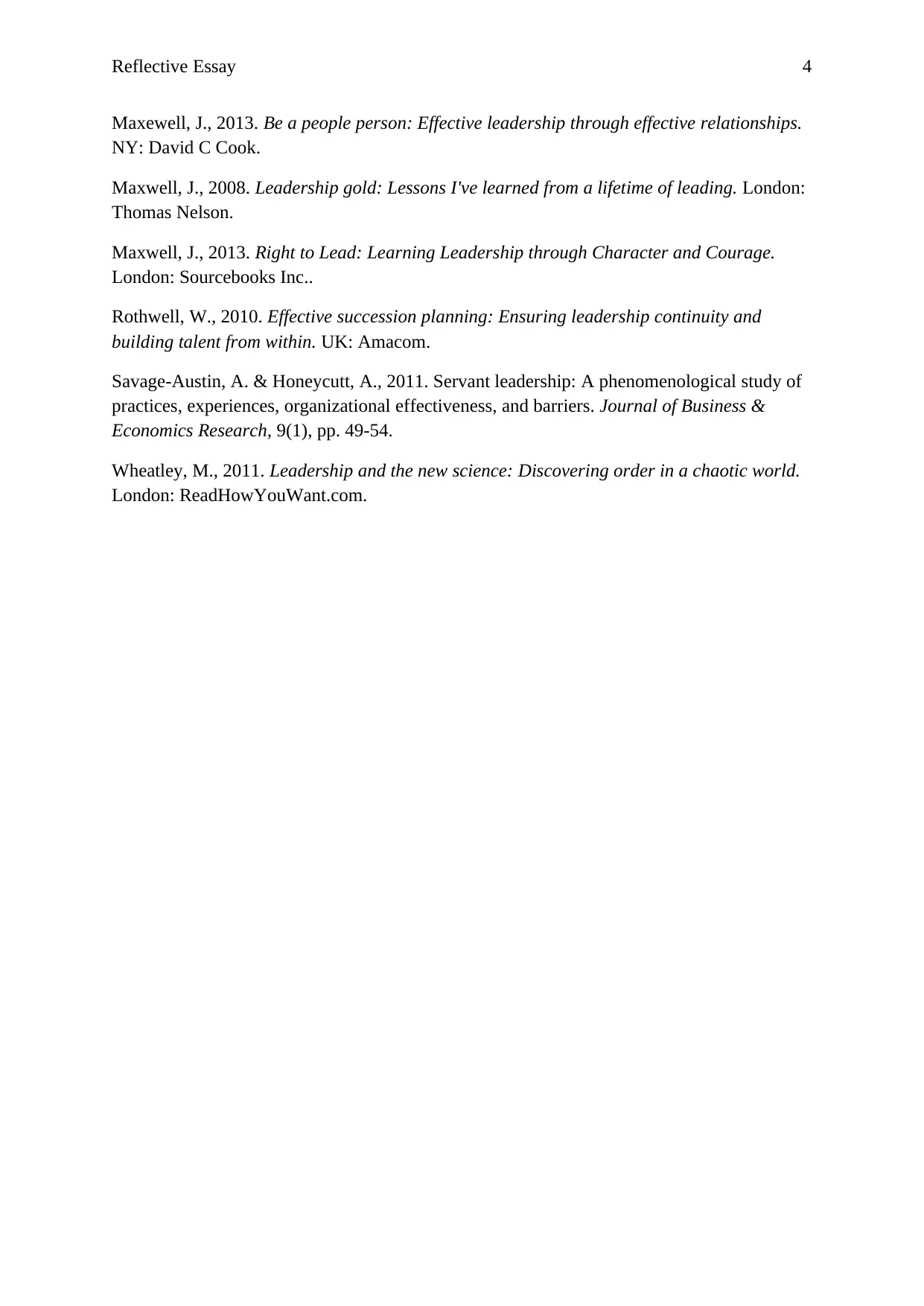
Reflective Essay 4
Maxewell, J., 2013. Be a people person: Effective leadership through effective relationships.
NY: David C Cook.
Maxwell, J., 2008. Leadership gold: Lessons I've learned from a lifetime of leading. London:
Thomas Nelson.
Maxwell, J., 2013. Right to Lead: Learning Leadership through Character and Courage.
London: Sourcebooks Inc..
Rothwell, W., 2010. Effective succession planning: Ensuring leadership continuity and
building talent from within. UK: Amacom.
Savage-Austin, A. & Honeycutt, A., 2011. Servant leadership: A phenomenological study of
practices, experiences, organizational effectiveness, and barriers. Journal of Business &
Economics Research, 9(1), pp. 49-54.
Wheatley, M., 2011. Leadership and the new science: Discovering order in a chaotic world.
London: ReadHowYouWant.com.
Maxewell, J., 2013. Be a people person: Effective leadership through effective relationships.
NY: David C Cook.
Maxwell, J., 2008. Leadership gold: Lessons I've learned from a lifetime of leading. London:
Thomas Nelson.
Maxwell, J., 2013. Right to Lead: Learning Leadership through Character and Courage.
London: Sourcebooks Inc..
Rothwell, W., 2010. Effective succession planning: Ensuring leadership continuity and
building talent from within. UK: Amacom.
Savage-Austin, A. & Honeycutt, A., 2011. Servant leadership: A phenomenological study of
practices, experiences, organizational effectiveness, and barriers. Journal of Business &
Economics Research, 9(1), pp. 49-54.
Wheatley, M., 2011. Leadership and the new science: Discovering order in a chaotic world.
London: ReadHowYouWant.com.
1 out of 5
Related Documents
Your All-in-One AI-Powered Toolkit for Academic Success.
+13062052269
info@desklib.com
Available 24*7 on WhatsApp / Email
![[object Object]](/_next/static/media/star-bottom.7253800d.svg)
Unlock your academic potential
Copyright © 2020–2026 A2Z Services. All Rights Reserved. Developed and managed by ZUCOL.




